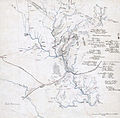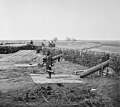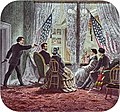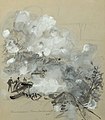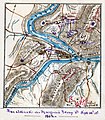Portal:American Civil War
 |
 |
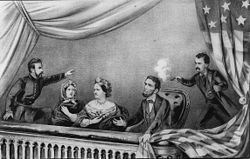
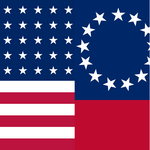
The American Civil War (1861–1865) was a sectional rebellion against the United States of America by the Confederate States, formed of eleven southern states' governments which moved to secede from the Union after the 1860 election of Abraham Lincoln as President of the United States. The Union's victory was eventually achieved by leveraging advantages in population, manufacturing and logistics and through a strategic naval blockade denying the Confederacy access to the world's markets.
In many ways, the conflict's central issues – the enslavement of African Americans, the role of constitutional federal government, and the rights of states – are still not completely resolved. Not surprisingly, the Confederate army's surrender at Appomattox on April 9,1865 did little to change many Americans' attitudes toward the potential powers of central government. The passage of the Thirteenth, Fourteenth and Fifteenth amendments to the Constitution in the years immediately following the war did not change the racial prejudice prevalent among Americans of the day; and the process of Reconstruction did not heal the deeply personal wounds inflicted by four brutal years of war and more than 970,000 casualties – 3 percent of the population, including approximately 560,000 deaths. As a result, controversies affected by the war's unresolved social, political, economic and racial tensions continue to shape contemporary American thought. The causes of the war, the reasons for the outcome, and even the name of the war itself are subjects of much discussion even today. (Full article)
The Wytheville Raid or Toland's Raid (July 18, 1863) was an attack by an undersized Union brigade on a Confederate town during the American Civil War. Union Colonel John Toland led a brigade of over 800 men against a Confederate force of about 130 soldiers and 120 civilians. The location of Wytheville, the county seat of Wythe County in southwestern Virginia, had strategic importance because of a nearby lead mine and the railroad that served it. This mine supplied lead for about one third of the Confederate Army's munitions, while the Virginia & Tennessee Railroad transported Confederate troops and supplies; plus telegraph wires along the railroad line were vital for communications. In addition to logistics of moving the lead to bullet manufacturing facilities, this rail line also connected an important salt works of an adjacent county with the wider Confederacy.
Toland's entire brigade was mounted, and consisted of a mounted infantry regiment plus eight companies of cavalry. It approached the small town of Wytheville on the evening of July 18. The community had been warned that a large force of Union horsemen was heading in its direction, and hastily made preparations before the brigade's arrival. While many in the community fled south or hid in their homes, a force of about 120 civilians (including home guard) volunteered to defend their town. The Union cavalry entered the town first, charging in column down the main road that led into town. The men from the cavalry were ambushed by Confederate soldiers, Home Guard, and local citizens. Most of the local men, and women, fired their one–shot muskets from inside their homes and businesses. This type of warfare was considered unconventional at the time. One Union soldier described the road as an "avenue of death". (Full article...)
At the time of the American Civil War (1861–1865), Canada did not yet exist as a federated nation. Instead, British North America consisted of the Province of Canada (parts of modern southern Ontario and southern Quebec) and the separate colonies of Newfoundland, New Brunswick, Prince Edward Island, Nova Scotia, British Columbia and Vancouver Island, as well as a crown territory administered by the Hudson's Bay Company called Rupert's Land. Britain and its colonies were officially neutral for the duration of the war. Despite this, tensions between Britain and the United States were high due to incidents such as the Trent Affair, blockade runners loaded with British arms supplies bound for the Confederacy, and the Confederate Navy commissioning of the CSS Alabama from Britain.
Canadians were largely opposed to slavery, and Canada had recently become the terminus of the Underground Railroad. Close economic and cultural links across the long border, also encouraged Canadian sympathy towards the Union. Between 33,000 and 55,000 men from British North America enlisted in the war, almost all of them fighting for Union forces. Some press and churches in Canada supported the secession, and some others did not. There was talk in London in 1861–62 of mediating the war or recognizing the Confederacy. Washington warned this meant war, and London feared Canada would quickly be seized by the Union army. (Full article...)
James Baird Weaver (June 12, 1833 – February 12, 1912) was an American politician in Iowa who was a member of the United States House of Representatives and two-time candidate for President of the United States.
Born in Ohio, he moved to Iowa as a boy when his family claimed a homestead on the frontier. He became politically active as a young man and was an advocate for farmers and laborers. He joined and quit several political parties in the furtherance of the progressive causes in which he believed. After serving in the Union Army in the American Civil War, Weaver returned to Iowa and worked for the election of Republican candidates. (Full article...)
- ... that according to one historian, James S. Rains made a "significant contribution to the Confederate war effort" by getting drunk?
- ... that at the Battle of La Haye-du-Puits in July 1944, a Confederate flag dating to the American Civil War was raised over the town?
- ... that Carter Moore Braxton fought for the Confederacy throughout the American Civil War and, according to one report, had seven horses killed under him but avoided any wounds?
- ... that Chinese-born Joseph Pierce enlisted as a Union Army soldier, fought at the Battle of Gettysburg during the American Civil War, and was made a corporal?
- ... that after the Little Rock campaign, Union forces held three-quarters of Arkansas?
- ... that Byron Root Pierce was Michigan's last living Civil War general?
- Attention needed
- ...to referencing and citation • ...to coverage and accuracy • ...to structure • ...to grammar • ...to supporting materials
- Popular pages
- Full list
- Cleanup needed
- The West Tennessee Raids
- Requested articles
- James Ashby (soldier) • Bluffton expedition • Benjamin D. Fearing • Charles A. Hickman • Richard Henry Jackson • James B. Speers • Charles S. Steedman • Battle of Barton's Station • Lawrence P. Graham • Thomas John Lucas • Daniel Henry Rucker • James Hughes Stokes • Frederick S. Sturmbaugh • Davis Tillson • Action at Nineveh (currently a redirect) • International response to the American Civil War • Spain and the American Civil War • Savannah Campaign Confederate order of battle • Native Americans in the American Civil War (currently disambiguation after deletion) • 1st Battalion, Mississippi Mounted Rifles (Union) • Battle of Lafayette • Requested American Civil War Medal of Honor recipients
- Expansion needed
- Battle of Boonsborough • Battle of Guard Hill • Battle of Rice's Station • Battle of Simmon's Bluff • Battle of Summit Point • Charleston Arsenal • Edenton Bell Battery • First Battle of Dalton • Blackshear Prison • Edwin Forbes • Hiram B. Granbury • Henry Thomas Harrison • Louis Hébert (colonel) • Benjamin G. Humphreys • Maynard Carbine • Hezekiah G. Spruill • Smith carbine • Edward C. Walthall • Confederate States Secretary of the Navy • Confederate States Secretary of the Treasury • David Henry Williams • Battle of Rome Cross Roads • Delaware in the American Civil War • Ironclad Board • United States Military Railroad • Kansas in the American Civil War • Rufus Daggett • Ebenezer Magoffin • Confederate Quartermaster-General's Department • First Corps, Army of Northern Virginia • Francis Laurens Vinton • Henry Maury • Smith's Expedition to Tupelo • Other American Civil War battle stubs • Other American Civil War stubs
- Images needed
- Battle of Lone Jack • Preston Pond, Jr. • Melancthon Smith
- Merging needed
- 1st Regiment New York Mounted Rifles and 7th Regiment New York Volunteer Cavalry
- Citations needed
- 1st Alabama Cavalry Regiment (Union) • 4th Maine Battery • 33rd Ohio Infantry • 110th New York Volunteer Infantry • Battle of Hatcher's Run • Camp Dennison • Confederate colonies • CSS Resolute • Dakota War of 1862 • Florida in the American Civil War • Ethan A. Hitchcock (general) • Fort Harker (Alabama) • Gettysburg (1993 film) • Iowa in the American Civil War • Second Battle of Fort Sumter • Samuel Benton
- Translation needed
- Add an article here!
The following Wikimedia Foundation sister projects provide more on this subject:
-
Commons
Free media repository -
Wikibooks
Free textbooks and manuals -
Wikidata
Free knowledge base -
Wikinews
Free-content news -
Wikiquote
Collection of quotations -
Wikisource
Free-content library -
Wikiversity
Free learning tools -
Wikivoyage
Free travel guide -
Wiktionary
Dictionary and thesaurus
- Shortcuts to this page: Portal:ACW • P:ACW



